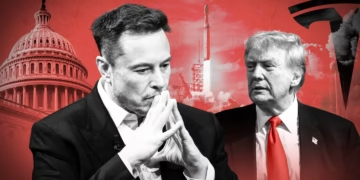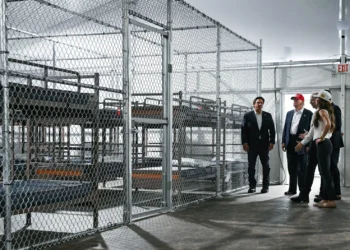Minnesota Braces for Potential Trump Pardon of Derek Chauvin Amid George Floyd Anniversary
As the fifth anniversary of George Floyd’s death approaches, Minnesota officials are preparing for the possibility that President Donald Trump may issue a federal pardon for Derek Chauvin. The former Minneapolis police officer is currently serving concurrent state and federal sentences for Floyd’s 2020 death. While speculation grows, state leaders emphasize that even a federal pardon would not free Chauvin from his state conviction.
Understanding the Legal Implications of a Potential Pardon

Derek Chauvin is currently serving a 22.5-year state sentence for second-degree unintentional murder alongside a concurrent 21-year federal sentence for violating Floyd’s civil rights. Legal experts emphasize a critical distinction in presidential pardon powers that many Americans may not understand.
“Trump has no power to pardon Chauvin’s state conviction. None,” Minnesota Attorney General Keith Ellison stated firmly. “A pardon of Chauvin’s federal conviction would only send him back to Minnesota to serve the remainder of his sentence in state prison.”
Presidential pardon authority extends exclusively to federal crimes, leaving state convictions entirely under state jurisdiction. This means that even with a federal pardon, Chauvin would remain imprisoned under Minnesota’s authority until at least 2035, when he becomes eligible for supervised release under state guidelines.
Minnesota Officials Prepare for Potential Fallout

Governor Tim Walz confirmed that while the White House has not signaled that a federal pardon is imminent, state agencies are taking precautionary measures. “If Donald Trump exercises his constitutional right to do so, whether I agree — and I strongly disagree with him — if he issues that pardon we will simply transfer Derek Chauvin to serve out his 22-and-a-half years in prison in Minnesota,” Walz stated.
Minneapolis Community Safety Commissioner Toddrick Barnette echoed this preparation stance: “To be clear, we have no credible intelligence about any pardon or planned disruptions here in Minneapolis. Since 2020, we’ve overhauled our emergency management plans and, out of an abundance of caution, are planning for any eventuality.”
According to local reports, the Minnesota National Guard, Minneapolis Mayor Jacob Frey, and Hennepin County Sheriff Dawanna Witt have all been briefed about possible civil unrest if a pardon is issued. The Minnesota Department of Corrections is reportedly prepared to transfer Chauvin from federal custody to the state’s Oak Park Heights Prison if necessary.
The Political Push Behind Pardon Speculation

Speculation about a possible Chauvin pardon has intensified following public advocacy from prominent conservative figures. Congresswoman Marjorie Taylor Greene recently joined calls for clemency, writing on social media: “I strongly support Derek Chauvin being pardoned and released from prison.”
Conservative commentator Ben Shapiro has been particularly vocal, launching a website to petition for Chauvin’s pardon. In an open letter to President Trump, Shapiro wrote: “Make no mistake — the Derek Chauvin conviction represents the defining achievement of the Woke movement in American politics. The country cannot turn the page on that dark, divisive, and racist era without righting this terrible wrong.”
These calls represent a significant shift from Trump’s position in 2020, when he stated: “All Americans were rightly sickened and revolted by the brutal death of George Floyd. My administration is fully committed that, for George and his family, justice will be served.”
Floyd Family and Supporters Respond

George Floyd’s family has responded strongly to calls for Chauvin’s pardon. Terrance Floyd, George’s brother, addressed Shapiro’s petition directly on CNN: “Stay in your lane. You know, your opinion is your opinion, but facts is facts. And the fact is, Chauvin’s knee was on my brother’s neck. The fact is, he held him down there to his last breath when he shouldn’t have.”
Civil rights advocates have characterized the pardon push as an attempt to rewrite history and undermine the justice system’s verdict. Richard Painter, a law professor and former chief White House ethics lawyer, noted: “Although not a factor in his conviction, Chauvin’s crime clearly involved racism. A pardon will rightly be seen as racially motivated.”
Chauvin’s Current Status and Prison Timeline

Derek Chauvin is currently serving his sentence in a federal prison in Texas, not Arizona as previously reported by some outlets. His projected release date from federal custody is November 2037, while his expected release from state custody is set for December 2035, after which he would remain on supervised release until 2043.
In 2023, Chauvin was stabbed 22 times by a fellow inmate in the law library at a federal prison in Tucson, Arizona, before being transferred to his current location. The attack highlighted the ongoing security concerns surrounding high-profile inmates like Chauvin.
| Conviction | Sentence | Projected Release |
| State (Second-degree murder) | 22.5 years | December 2035 |
| Federal (Civil rights violations) | 21 years | November 2037 |
The Broader National Debate

The speculation about a Chauvin pardon highlights the ongoing national debate over police accountability and criminal justice reform. For supporters of the Black Lives Matter movement and police reform advocates, Chauvin’s conviction represented a rare instance of accountability in a system often criticized for protecting law enforcement officers.
Conversely, some conservative voices have characterized Chauvin’s conviction as politically motivated and influenced by public pressure rather than evidence. This divide reflects broader political tensions that continue to shape American discourse on race, policing, and justice.
As the fifth anniversary of Floyd’s death approaches on May 25, both Minneapolis officials and community leaders are preparing for commemorations while remaining alert to the possibility of renewed tensions if a pardon is issued.
What Happens Next

While speculation continues, President Trump has previously denied plans to pardon Chauvin. When asked by reporters in March, he stated, “No, I have not heard about that.” However, the administration’s position could evolve, particularly as political pressure from certain segments of Trump’s base increases.
Minnesota officials emphasize that they are prepared for any outcome. An internal email from a deputy city operations officer in Minneapolis informed city employees that officials would publicly condemn any pardon, even though it wouldn’t affect Chauvin’s state sentence.
As this situation develops, the legal, political, and social implications of a potential pardon will continue to be closely watched by Americans across the political spectrum, with particular attention from Minnesota communities still healing from the events of 2020.
Stay Updated on This Developing Story
Get breaking news alerts and in-depth analysis as this situation unfolds. Our newsletter provides context beyond the headlines on criminal justice issues and political developments.
Follow This Story as It Develops
Get expert analysis on criminal justice issues, presidential powers, and the ongoing national conversation about police accountability. Our newsletter provides context beyond the headlines.





















































